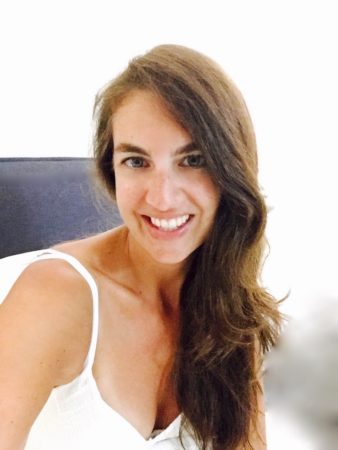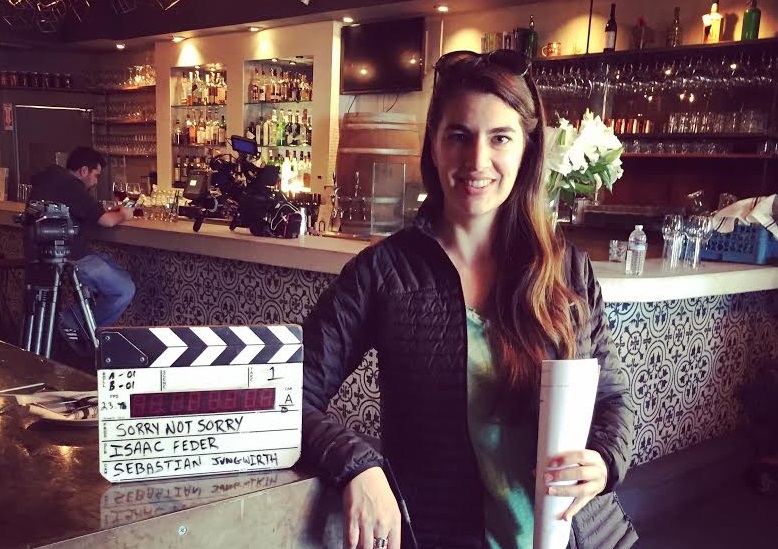By David Bjorkgren, Editor
Special to the Hellenic News of America
Lia Bozonelis is charting a successful 15-year path through Hollywood as a rare entity—a woman screenwriter. It has not been a straight and narrow journey. As she navigated the sometimes dark roads of the film and television industry, she took with her a passion for writing, her Greek Orthodox faith and the love and support of family.
“Every calamity that you hear about in Hollywood is true,” she said. “It was very difficult to navigate the track, especially as a female in the industry.”
This is a town where 90 percent of the screenwriters are men, which is why Bozonelis’ two most recent projects, new series “Sorry Not Sorry” and a brand new feature script are so close to her heart.

The official logo for Sorry Not Sorry One of her first tasks as Consulting Producer and Head Writer for “Sorry Not Sorry” was to help ensure the writing staff be 75 percent female. It was a controversial move that showed she was championing the core values of the #TimesUp movement before it even had a name.
“Sorry Not Sorry” is a feminist sketch comedy series produced by Astronauts Wanted, Complex Networks and DiGa Studio. It streams on Go90, Verizon’s video streaming app.
The edgy, unapologetic show combines sketch comedy, scenes, music videos and “man on the street” spots to talk about niche categories relatable to its millennial audience. “Sorry Not Sorry’s” eight episodes were some of the first to come out on Go90. If you look closely, you’ll see Bozonelis play a few offbeat ‘extra’ roles.
“I’m very proud of this thing that we created,” she said. “The show not only employs women, it delivers content for women, mostly by women, with strong female characters and voices. Feedback on the show has been very positive,” she added.
“We’re living through a vitally important time in Hollywood. As someone who can without question say, #MeToo, I am beyond inspired to be on the frontlines of the #TimesUp movement – to fight for women, to empower women, to tell these stories and to say never, ever, ever again.”
Bozonelis is starting to see good things happen within the entertainment landscape. “Studios and production companies are making concerted efforts to create forums for women, to hire more women, to give women the opportunity that they’ve long deserved,” she said.
The goal is to make everyone comfortable and safe, while garnering power and supporting each other. “We have to keep it inclusive and we have to keep reminding each other that we’re worth a lot more than this and we shouldn’t back down in the face of adversity,” she said.

“If men won’t hire women, women will hire each other,” she said, pointing out how difficult it is for females to get opportunities in Hollywood. For screenwriters like her, the aim is to find creative ways to tell female-driven stories that will reach a wide audience
With that in mind, Bozonelis talks about a new feature film screenplay she just finished, which is set in Greece. It’s an opportunity to tell a relevant story that females – and males alike – will relate to while living smack dab in the middle of this cultural movement.
There are countless stories of #Metoo victims lingering behind closed doors, afraid to speak up. In her new screenplay, she holds a mirror up to them and wraps them in a comedic construct so people find the content inclusive and accessible. “Telling this story in a comedic way in no way diminishes the darkness, it just adds some much-needed levity. And keeps it authentic. Because life is not a straight line – we laugh, we cry, we hurt, we love, even in difficult times. That’s what’s real,” she said.
The story poured out of her as she realized she could juxtapose the difficult subjects of harassment and abuse with the healing properties of Greece. “I found a way to marry the two ideas and I’m very excited about the execution. My focus right now is getting this movie out there and getting it made – the time for this type of movie is now.”

Greece is the birthplace of storytelling and evokes perspectives on life and love. Plus, filming in Greece might bring American production companies back to Greece, providing a boost to the economy and creating local production jobs. One of the last big American studio movies made in Greece was “Mamma Mia!” so it’s time, she said, especially since Greece lost production rights for the sequel to Croatia.
“The Greeks are so hospitable so I have this dream of being over there, helping generate interest and tourism, as well as crew jobs for talented locals. There are no better people on the planet, in my opinion.”
In conjunction with her culture, the Greek Orthodox faith is an extremely important component to Bozonelis’ life, particularly while in Los Angeles.
“There are a lot of blurry lines and I credit the Greek Orthodox faith for giving me such a solid moral compass. I come from a strong religious family and I am so happy and so fortunate to have that ingrained in me. My path might be the longest one, but I don’t mind because I know I’m staying above board the entire time,” she said.
Bozonelis found St. Sophia Church in Los Angeles when she first arrived. “I came to Los Angeles not knowing a soul and church was an instant community for me. It was this relief, this sense of peace, to walk through those doors knowing I was surrounded by other Greek people who share the same faith. Some of my closest friends out here are people I’ve met through the church.” In addition, she lists Vlas and Charley Parlapanides (brothers, writers of “The Immortals” and “Death Note”) as her Greek Hollywood mentors. “We met at coffee hour – seriously!”
Bozonelis was born in New Jersey and grew up in Chatham, where her parents, Theodore and Helen, still live. Her brother Justin resides in Manhattan. “I loved growing up in Chatham. We were one of just a couple of Greek families.” They attended Holy Trinity in Westfield where her family has been members for nearly 40 years.
Both of her parents were born in the United States. Her mother lived in Rhode Island. Her father grew up in New Jersey. They met at university.
Her mother has always been active in the Greek culture and church life, serving as a Sunday school teacher for over 20 years. Her father has been an archon for 10 years and has served as National Secretary for two. Her brother was inducted as an archon this past fall and is very active in bringing young professionals together within the Greek community.

Her mother’s family originates from Patras, her father’s from Nafplion. They try to get back to her mother’s village to see distant relatives when they can, though most of the family is in America.
To that end, she greatly appreciates the work of the Hellenic News. “I think it’s a great resource because there are so few opportunities where Greeks from all over the country are able to share stories.”
Bozonelis said her Greek heritage is her identity. “It’s how I live and breathe. I’m so in love with our culture, with our religion, with our people,” she said. “I’m proud to be Greek.” Combining her heritage with her profession, Bozonelis has volunteered with the Los Angeles Greek Film Festival for seven years.
A keen observer of people, she has been drawn to storytelling since she was young, gravitating to character-driven stories. It seemed natural to combine her writing desire with her love of movies and become a screenwriter.
She went to George Washington University’s School of Media and Public Affairs in Washington D.C., majoring in journalism, minoring in music. She spent time abroad during her college years, picked up four languages, and after, taught English as a Second Language in Italy.
Her screenwriting career took a leap when she went to work for New Line Cinema. It was an exciting time to be at New Line, which had released the “Lord of the Rings” franchise and was having success with comedies like “Rush Hour” as well as sleeper hits like, “The Notebook.”
It was at New Line that she learned about the commercial end of big budget movies. She then went to Picturehouse Films, a production and distribution company that was a joint venture of HBO Films, Fine Line Features (New Line’s arthouse division) and Newmarket Films. “I had learned a lot from the person who ran the company, Bob Berney. He was known to be this marketing mogul.” Berney took small budgeted movies like “My Big Fat Greek Wedding” and “Passion of the Christ” and turned them into huge box office successes.
Bozonelis left Picturehouse to write screenplays full time. “I moved back in with my parents to write feature films and I very quickly learned I needed another job because that was not going to pay any time soon,” she said.
Her next career move came in 2007, when she took a job at Fortune Magazine reporting on Fortune 500 conferences. For two years, she traveled the world, to New Delhi, India, reporting on the Global Economic Forum and covering the Prime Minister, then at Silicon Valley for the Brainstorm Tech Conference and in Los Angeles at the Brainstorm Green Conference.
She continued to write screenplays and worked to get them produced. “I packaged a number of movies,” she said, getting actors, producers and directors on board for a project. The film market was getting more difficult even as content for television was exploding. “Feature films can be heart-breaking in the sense that there’s no definitive timeline so you spend sometimes years putting together these films,” she said. “I have several packaged movies that may never get made. It became so frustrating that I said, ‘OK, how can I take control back?’”
She became a screenwriter for Atlas Entertainment (a production company known for “Wonder Woman”, the “Batman” franchise and “American Hustle”), as well as New Line Cinema, Momentum TV and many other studios and production companies.
Running parallel with screenwriting was her consulting work, a stable way to deal with the job volatility of Hollywood.
She ended up reading scripts for New Line Cinema, HBO and OddLot Entertainment, among others. Her role expanded and she became a story consultant for Ridley Scott’s company, Scott Free and George Clooney’s company, Smokehouse Pictures. That led her to Netflix, where for two years she’s been a story consultant for their $10 million and under indie film division. She loves her role because she can be an advocate for new talent and innovative storytelling while keeping her own story chops in check. “Netflix is doing pretty amazing things content-wise,” she adds. “It’s a gift to be on the ground floor of it.”
She’s gratified at this point in her career to see her projects getting made and people responding to her work. Besides “Sorry Not Sorry,” she’s also had a great response to a post-apocalyptic dark comedy series for Café.com, a news and political satire site. “The idea is to poke fun at people in the sense of ‘How do we maintain self-care in the nuclear apocalypse? How do you build your dream bunker? How do you stay ‘nuclear thin’ or launch a pop-up restaurant?’” The videos are edgy and “out there” but received 120,000 hits just a few hours after their launch.
For those looking to pursue a similar career, she advises screenwriter wannabes to have “patience of steel.”
“There are countless steps between writing something and actually getting it made and distributed. In so many different ways, something can go wrong. Whenever anyone makes a film it is miraculous,” she said. “And truly a win.”
“I’m very proud of the fact that I’ve stuck with it, weathered every storm and clawed my way to this point with no connections. I’ve built my own network and will pay it back and forward by helping other women. It’s an exciting time to be a female in this industry and I’m hopeful it’s only uphill from here,” she said. “#TimesUp!”







